- Home
- Roy J. Snell
Sign of the Green Arrow Page 11
Sign of the Green Arrow Read online
Page 11
CHAPTER XI TIGERS OF THE SEA
Doris, standing on the ocean's floor forty feet down, started back insudden terror, and her foot struck a rock. She all but fell over. On thebeach she would have taken a terrible tumble.
"It was just a shadow," she told herself. "Only a shadow moving beyondthat great rock. A blue shadow. Grandfather said I'd be in no danger, andhe should know."
Involuntarily she put a hand over her wildly beating heart, then smiledat her action and at once felt better.
"I must finish," she told herself, stoutly, as she resumed her task.
She was painting a picture. The circumstances under which she worked werestrange, almost beyond belief. When Johnny had suggested an underseaspicture, she had been truly thrilled. But she had shuddered and said,"No!--I'd never dare do that!"
But--given one glimpse of the setting for such a picture, she had becomegreatly excited. "Such colors! Such contrasts! Yes--I surely must paintit!" she had exclaimed.
The task now was well begun. She was wearing tennis shoes and standing onsand. Before her a great anchor, red with rust, leaned against a hugeboulder. Beside the anchor was a copper-bound chest. One might easilyhave imagined that this chest contained Spanish treasure--gold, diamonds,rubies. But it was empty, as Doris already had discovered.
The gray rock that supported the anchor was festooned with vegetation ofrare hues--red, orange, pink, yellow, and deep dark blue, mingled inprofusion. In and out among these plants darted small creatures whichmight almost have been birds. The girl was wearing a great brass helmetwhich hid her face. She was looking through glass, at a worldunbelievably strange and beautiful.
Above her, its shadow looming darkly, lay the _Sea Nymph_. Descendingfrom the boat was a long tube that supplied her with air. A constanttrickle of bubbles escaped from beneath her helmet. Her easel wasweighted down, and her canvas specially treated to resist water. Herbrushes and colors were the same she had used on the sunny, tropicalshores.
But the scene! How she thrilled to it! And she was painting it as trulyand exactly as she could. Perhaps thousands who never had been beneaththe surface of the water would look at this picture and wonder at itscoloring.
Thrilled at the thought, she painted more industriously than ever,forgetting entirely the blue shadow. She had searched long for a spotthat would make the most interesting picture. She had wandered,fascinated, until she had chanced upon this anchor and strong box, lostso long before.
It was indeed wonderful. With a background of ivory and pink coral,purple plumes of seaweed, fringes of lace-like anemone, in a framework ofwater-washed rocks--it made a scene not soon to be forgotten.
So here she was, painting rapidly--though far back in her mind was thememory of that blue shadow behind the rock....
The scene was forever changing. A cloud passing over the sun, dimmed thecolors. Then a large school of small fish, darting forward at a furiousrate, completely shut off her view.
But now! "Ah, now!" she thought, joyously.
A dozen tropical fish, the brightest and best she ever had seen, came toplay about the ancient chest and "pose" for their pictures. With quick,deft touches she painted them in--two, staring large-eyed at theanchor--three, peering into the ancient chest, and three just "resting".
But what was this?
Like a flock of birds that have caught sight of a circling hawk, thetropical fish darted swiftly away. Had they caught a glimpse of adangerous foe, gliding from behind the rock? The girl thought so, andshuddered. She even fancied she had caught its color again--dark blue.But of this she could not be sure. Down here all was so strange.
"A villain," she murmured to herself with a low laugh. "The final touchto a gorgeous setting."
To quiet her shaky nerves she gave herself more intensively to completionof her task.
"There is no danger," she assured herself again. "Grandfather says thereis absolutely none--and he has spent days on end on the ocean's floor."
She recalled his very words: "Oh, yes, there are sharks in thesewaters--but they won't harm you. If they should get curious and come tooclose--poke them with your stick! I've done that more than once."
Scarcely had she gone over these reassuring words when something startledher, anew. A dark shadow appeared suddenly at her right. She took onelook, then laughed. "It's only a fish," she thought.
Brushing away two tiny fish that had managed to get themselves stuck toher canvas, she began giving her work its final touches.
For ten full minutes she worked feverishly. "My time is almost up," shewas thinking. "They will be giving me the signal. Then up I'll go. But Ido so want--"
Her thoughts were suddenly arrested. What was that? She had felt themotion of water against her body. "As if something passed--fast!" shethought with a little shudder. Turning slowly about, she peered throughthe window of her brass helmet.
"Nothing," she whispered. "Nothing but three long, gray fish, over there.But what of that? I--I'll give my signal rope a pull," she told herself."Just a minute more and I'll do it."
The minute stretched to two, three, four. And then it happened. One ofthe long, gray fish flashed like a streak of doom, straight for the handthat held the paint brush. Missing by inches, it collided with the easel,knocked it to the sea floor and shot away in sudden flight.
The fish could not have been more frightened than the girl. Suddenly sherecalled wild tales told by the natives about the viciousbarracuda--"Tiger of the Sea." ... A woman had dabbled a finger in thewater--and one of these fish snapped it off.... Swimmers had losttoes.... She felt paralyzed with fear.
Then, like an act in some strange drama, a pair of dangling legs appearedbetween her and the gray terrors. The legs were followed swiftly by abody, a brass helmeted head and two hands, holding a sharp-pointed spear.
The spear shot out!
The gray terrors, like arrows from a bow, flashed out of sight. It seemedto Doris that no creatures ever had moved so rapidly beneath the surfaceof the sea.
She watched the "apparition" in a helmet--which she knew to beJohnny--take up her easel and set it in position. She noted, vaguely,that the picture had landed right side up and was not harmed. Then Johnnyturned and held out his hand.
She expected to be taken straight up to the ship's deck. Instead, he ledher a distance of a hundred feet along the bottom. Then they came to anabrupt halt, and Johnny pointed straight down.
She looked--and involuntarily stepped back. They were standing on thevery brink of a yawning, watery precipice. Far down as one could see wasonly blue-black depth. It was an awe-inspiring sight.
As if to add to her amazement, she saw--perhaps a hundred feet down--somelarge, dark hulk. It was dim and indistinct as a shadow, yet very real,as it moved slowly along the cliff, to disappear in the blue-black of theapparently bottomless ocean.
This had not been part of the planned show, she knew at once from herguide's actions. He moved his arm, pointing excitedly.
A moment longer they stood there, looking down. Then came the signal tocome up. The picture and paints were attached to the easel, and a corddrew them up. All Doris had to do was to give a little spring, and up,up, she rose, to the glorious sunshine of a tropical day.
A quarter of an hour later, she and Johnny were seated on the deck,laughing at one another and scarcely knowing why.
Dave and the professor had gone ashore to study tropical bird life, soafter the evening meal, Johnny and Doris sat on deck watching the play ofphosphorescent creatures beneath the surface of the sea.
"This," said Johnny, "is my day off. Tonight I sleep. Tomorrow oldSamatan and I are going for a sail in a large dugout, to visit some coralreefs."
Doris smoothed back her thick, golden hair, fixed her bright blue eyes onhim, and said: "Why?"
"We need him for a friend," Johnny replied, quietly. "If _he_ is withus--all the native crew will be, too. He's a leader."
"You talk," said Doris, "as if ther
e were to be war!"
"Who knows?" Johnny did not laugh. "Perhaps there will be, but not justyet. There are spies with us now!"
"How do you know?" She leaned forward in her chair.
"That man I caught on board the other night, was a spy. Look!" He held upthe exquisitely wrought knife. "Do you think a native would have such agem of a knife? Not a chance!
"Then--there's the green arrow to prove he's a spy!" Johnny went on. "Oneof the messages I spelled out by using their code read: '_Board them.Discover all you can._'"
"But why?" said Doris. "We're not secret agents."
"That's what _they don't know_! We are Americans--and they don't want usaround."
"Know what?" Johnny continued, "I believe that big thing that glidesthrough the water--the thing we saw today--is a submarine!"
"It can't be!"
"Why not?"
"Well, if it is--it must be an American submarine!"
Johnny looked at her for a moment in silence.
"It's not an American submarine," he said, after a time. "I've seen them,and this one's the wrong shape. It's some spy submarine, looking over thebottom of the sea and getting information for the next war. I shouldn'tbe surprised if a large part of that war were fought right in thisCaribbean Sea!
"What's more,"--he rose to his feet--"I'll bet a dollar that the thingthat took Samatan and me for a ride in the steel ball, _was that samesubmarine_!"
"Trouble with you," Doris laughed merrily, "is too much imagination."
"You just wait and see," Johnny replied with a smile.
The sound of oars at this moment, announced the return of Dave and theprofessor from their day's explorations.

 On the Yukon Trail
On the Yukon Trail Wings over England
Wings over England Johnny Longbow
Johnny Longbow Sally Scott of the WAVES
Sally Scott of the WAVES The Secret Mark
The Secret Mark Betty Leicester's Christmas
Betty Leicester's Christmas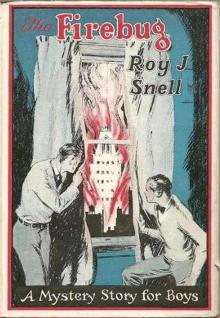 The Firebug
The Firebug Minnie Brown; or, The Gentle Girl
Minnie Brown; or, The Gentle Girl Jack the Hunchback: A Story of Adventure on the Coast of Maine
Jack the Hunchback: A Story of Adventure on the Coast of Maine The Silent Alarm
The Silent Alarm The Arrow of Fire
The Arrow of Fire The Magic Curtain
The Magic Curtain The Crystal Ball
The Crystal Ball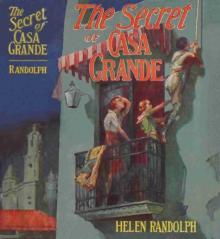 The Secret of Casa Grande
The Secret of Casa Grande Gypsy Flight
Gypsy Flight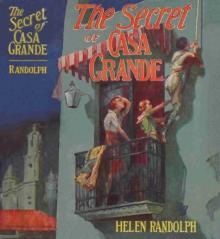 The Mystery of Carlitos
The Mystery of Carlitos The Meadow-Brook Girls on the Tennis Courts; Or, Winning Out in the Big Tournament
The Meadow-Brook Girls on the Tennis Courts; Or, Winning Out in the Big Tournament Witches Cove
Witches Cove Riddle of the Storm
Riddle of the Storm Forbidden Cargoes
Forbidden Cargoes Green Eyes
Green Eyes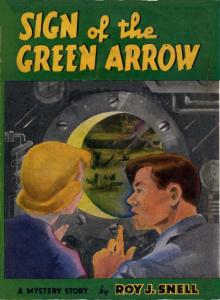 Sign of the Green Arrow
Sign of the Green Arrow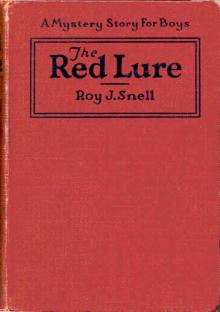 The Red Lure
The Red Lure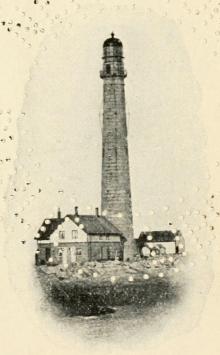 The Light Keepers: A Story of the United States Light-house Service
The Light Keepers: A Story of the United States Light-house Service A Ticket to Adventure
A Ticket to Adventure Helen in the Editor's Chair
Helen in the Editor's Chair Blue Envelope
Blue Envelope The Purple Flame
The Purple Flame Whispers at Dawn; Or, The Eye
Whispers at Dawn; Or, The Eye The Rope of Gold
The Rope of Gold Crossed Trails in Mexico
Crossed Trails in Mexico The Shadow Passes
The Shadow Passes Red Dynamite
Red Dynamite Blue Grass Seminary Girls on the Water
Blue Grass Seminary Girls on the Water The Cruise of the O Moo
The Cruise of the O Moo